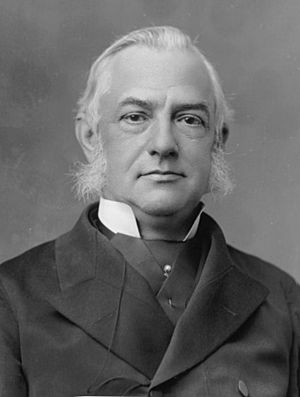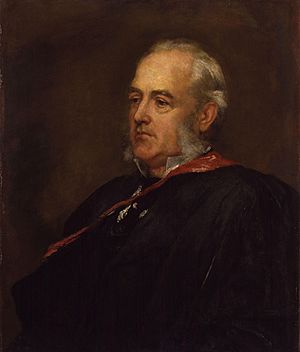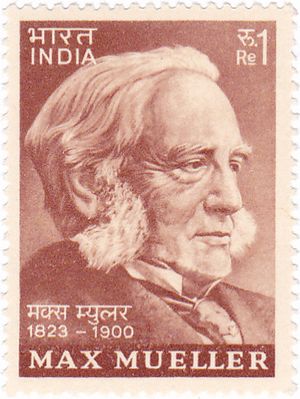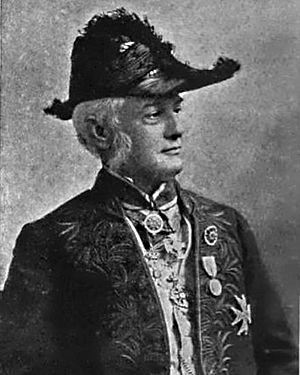Max Müller facts for kids
Quick facts for kids
Max Müller
|
|
|---|---|

Müller photographed in 1883 by Alexander Bassano
|
|
| Born | Friedrich Max Müller 6 December 1823 Dessau, Duchy of Anhalt, German Confederation |
| Died | 28 October 1900 (aged 76) Oxford, Oxfordshire, England |
| Occupation | Writer, scholar |
| Nationality | British |
| Education | University of Leipzig |
| Notable works | The Sacred Books of the East, Chips from a German Workshop |
| Spouse | Georgina Adelaide Grenfell |
| Children | Wilhelm Max Müller |
| Signature | |
Friedrich Max Müller (born December 6, 1823 – died October 28, 1900) was a famous scholar. He was born in Germany but lived and studied in Britain for most of his life. He was a philologist, which means he studied languages and their history. He was also an Orientalist, someone who studies the cultures, languages, and history of Eastern countries, especially Asia.
Max Müller helped create the Western academic fields of Indian studies and religious studies. He wrote many books and articles about India. One of his biggest projects was leading the creation of Sacred Books of the East. This was a huge collection of 50 volumes of English translations of important religious texts from Asia.
Contents
Early Life and Learning
Max Müller was born on December 6, 1823, in Dessau, Germany. His father, Wilhelm Müller, was a well-known poet. His mother, Adelheid Müller, came from an important family. Even the famous composer Carl Maria von Weber was his godfather.
Max Müller was named after his mother's brother, Friedrich, and a character named Max from an opera. Later in life, he started using "Max" as part of his last name. He felt that "Müller" was too common.
When he was six, Max Müller started grammar school in Dessau. In 1829, he moved to the Nicolai School in Leipzig. There, he continued to study music and classic subjects like Latin and Greek. He often met the famous composer Felix Mendelssohn during this time.
To get a scholarship for Leipzig University, Müller had to pass a special exam. He quickly learned new subjects like math and modern languages. In 1841, he started studying philology at Leipzig University. He earned his degree in 1843. He was very good at learning languages, including Greek, Latin, Arabic, Persian, and Sanskrit.
Becoming a Professor at Oxford
In 1850, Max Müller became a professor at Oxford University. He taught modern European languages. A year later, he was given an honorary master's degree. In 1854, he became a full professor.
In 1860, he tried to become the Boden Professor of Sanskrit. He was very qualified for the job. However, he did not win the election. Some people thought his religious views were too broad. Others worried about him being German-born and not having lived in India.
Later, in 1868, Müller became Oxford's first Professor of Comparative Philology. This new position was created just for him. He held this job until he died, though he stopped teaching actively in 1875.
His Important Books and Studies
Studying Ancient India
Before working at Oxford, Müller studied in Berlin in 1844. He started translating ancient Indian texts called the Upanishads. He also studied Sanskrit, an ancient Indian language. He learned that the history of language is connected to the history of religion. His first book was a German translation of the Hitopadesa, a collection of Indian fables.
In 1845, Müller moved to Paris to continue his Sanskrit studies. He was encouraged to publish the complete Rigveda. This is one of the oldest and most important texts in India. He moved to England in 1846 to study Sanskrit texts owned by the East India Company.
Müller's work on Sanskrit came at an important time. Scholars were starting to see how language and culture developed together. They found that many European and Asian languages were related. This group of languages is called Indo-European languages. The ancient Indian language, Sanskrit, was thought to be one of the oldest.
Müller believed that studying ancient Indian texts like the Vedas could help understand early European religions. He thought the Vedic culture of India was very old and important. He spent many years working on a special edition of the Rig-Veda (1849–1874).

Müller thought that the development of languages was linked to how people's beliefs changed. He saw the gods in the Rig-Veda as forces of nature that people imagined as persons. He believed that myths were like a "disease of language." This meant that words for abstract ideas could turn into stories and characters over time. For example, he thought the names for father-gods like Zeus and Jupiter came from an old word meaning "shining."
Lectures on Religion
In 1888, Müller gave a series of important lectures at the University of Glasgow. These were called the Gifford Lectures. He gave four sets of lectures over the next four years:
- Natural Religion: This first set talked about what natural religion means in a broad sense.
- Physical Religion: This second set showed how different nations came to believe in something infinite and invisible in nature. They believed in many gods of nature, and then in one main god.
- Anthropological Religion: This third set explored how different nations believed in a soul. It looked at what they thought happened to the soul after death.
- Theosophy or Psychological Religion: The last set of lectures looked at the connection between God and the soul. Müller believed that true religion comes from understanding this connection.
Translating Important Books
In 1881, Müller translated the first edition of Kant's Critique of Pure Reason. This is a very important book in philosophy. Müller believed this edition showed Kant's ideas most clearly. He also thought that this book was as valuable to the English-speaking world as the ancient Indian Veda.
Müller believed that language was a clear barrier between humans and animals. He did not agree with Charles Darwin's ideas about human development.
His Thoughts on India
Early Ideas on India
Early in his career, Müller believed that Hinduism needed a "reformation." He thought it should change, similar to how Christianity changed during the Reformation. He felt that older religions were purer and that later forms had problems.
He worked with a group called the Brahmo Samaj in India. He hoped they would help create an Indian form of Christianity. He thought they were like Christians, but without being Catholic or Protestant. He hoped that what he saw as "superstition" in popular Hinduism would disappear.
Müller believed that translating the Veda would greatly affect India. He thought showing people the "root" of their religion would help change things that had developed over 3,000 years.
He also hoped that more education in India would lead to new literature. He wanted this literature to mix Western ideas with Indian traditions. He wrote that India had been conquered once, but it needed to be "conquered again by education." He believed this would bring new national pride and strength.
Later Views on India
When he was older, Müller's views on Hinduism became more positive. In a lecture called "What can India teach us?" at Cambridge University, he praised ancient Sanskrit literature and India.
If I were to look over the whole world to find out the country most richly endowed with all the wealth, power, and beauty that nature can bestow—in some parts a very paradise on earth—I should point to India. If I were asked under what sky the human mind has most full developed some of its choicest gifts, has most deeply pondered on the greatest problems of life, and has found solutions of some of them which well deserve the attention even of those who have studied Plato and Kant—I should point to India.
—Max Müller, (1883)
He also thought that the arrival of Islam in India around the 11th century changed how Hindus behaved. He believed that Hindus had been very truthful in ancient times. He said that after reading about the difficulties of Muslim rule, he was surprised that so much honesty had survived.
Swami Vivekananda, a famous Indian spiritual leader, met Müller in 1896. Vivekananda was very impressed by Müller and his wife. He felt that Müller was not just a scholar, but a spiritual person who understood the oneness of the universe.
Awards and Recognition
In 1869, Müller was chosen as a foreign member of a French academic group called the Académie des Inscriptions et Belles-Lettres.
In 1874, he received a high German award called the Pour le Mérite. He was very surprised and proud.
In 1875, he received the Bavarian Maximilian Order for Science and Art. This award is given for great achievements in science and art. Müller thought this award was even more impressive than the Pour le Mérite.
In 1896, Müller became a member of the Privy Council. This is a group of important advisors to the British monarch.
His Family Life
Max Müller became a British citizen in 1855 when he was 32 years old.
He married Georgina Adelaide Grenfell on August 3, 1859. They had four children: Ada, Mary, Beatrice, and Wilhelm Max. Sadly, two of their children died before them.
After his death, his wife Georgina (who died in 1919) had all his papers and letters organized. They are now kept at the Bodleian Library in Oxford.
Death and His Legacy
Max Müller's health began to get worse in 1898. He passed away at his home in Oxford on October 28, 1900. He was buried at Holywell Cemetery on November 1, 1900.
After he died, a special fund was created at Oxford. It was meant to support learning and research about the history, languages, literature, and religions of ancient India.
The Goethe Institutes in India are named Max Müller Bhavan in his honor. A street in New Delhi is also named Max Mueller Marg.
Several books have been written about Max Müller's life. These include biographies by Lourens van den Bosch (2002), Jon R. Stone (2002), and Nirad C. Chaudhuri (1974).
Images for kids
See also
 In Spanish: Max Müller para niños
In Spanish: Max Müller para niños
 | Delilah Pierce |
 | Gordon Parks |
 | Augusta Savage |
 | Charles Ethan Porter |




